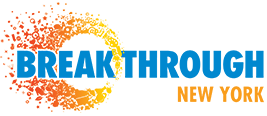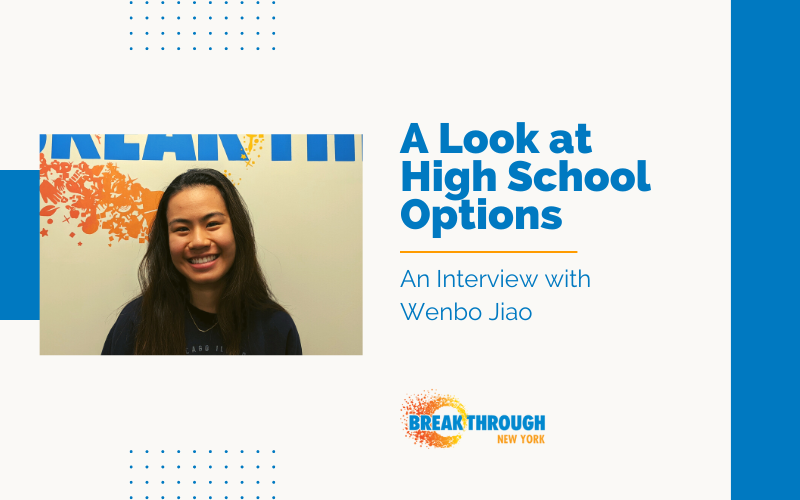Breakthrough New York 8th graders complete a rigorous high school options curriculum that teaches them about different types of schools and helps them apply.
Wenbo Jiao is a Breakthrough seasonal staff member who has served in a variety of different positions, including Teaching Assistant and Operations Assistant. Her most recent role as High School Placement Assistant guides 8th graders through the process of applying to high schools. She delves into the challenges she saw students face and suggests changes that could make the process more equitable and accessible for all applicants.
Tell us about your role as High School Placement Assistant. What are your responsibilities?
I would describe my role as being the bridge between families and the rest of the Breakthrough staff. A lot of that involved essay brainstorming and editing. Holding weekly meetings with all students to look over essays, talk about them, [and] talk about next steps. And then also communicating with families – talking with parents about where their students were, if families had any questions about what this parent statement means, or how to register for something.
For the first few weeks, I taught the high school options class, going over the New York City high school environment [and] schools that are options for them. I would also say part of my role was writing recommendation letters for some of my students and tracking their data.
What were the main challenges that you saw students face as they went through this process?
The biggest one is balancing school, the social life, and then also completing admissions. It’s a lot for them, especially since the admission process here [in New York City] is so competitive. Each school had multiple pieces they needed to complete.
Some of the essay questions really push students to think deeply. They’re asking students to dig into why they care about the things that they care about. They are 13-year-olds, and while they’re capable of doing hard things, I think it’s a new thing that they’ve never really had to do in terms of really trying to understand who they are and why they care about things.
How did you lead them through that process?
Asking questions. [Keep] asking “why?” before they [start] to form thoughts about a bigger idea, more than just “I like math because it’s fun.” Why do you like math? We would keep asking questions until we got to the point where we were like, “I like math because it challenges me. I also like to take all the things that I’ve learned and [put] it together to get a specific result.”
How would you say your role contributes to equity in education?
I think the biggest part is the essay drafting and editing. I’m checking anything from grammar to content. I say this specific part of my job because there are a lot of students in the New York City area that can afford to have an outside placement manager, like a guidance counselor but only for them. That’s not the case for our students. Ensuring that I’m showing up for every student and putting forth my best effort [so] that every student gets equal treatment and energy from me is really important.
Some of my students have guidance counselors that can provide that one-on-one attention, but I also have students [who] don’t have guidance counselors at their schools, or the guidance counselor doesn’t play a huge role in their admissions process.
What would you change about the application process and why?
Probably the workload. The amount of work they have to do. I think the reason why there’s so much is because schools are pushing for a holistic review. I’m all for holistic review, but some schools require five to six pieces [for] their admissions. I think that contributes to inequity in the system because there’s so much to do; there are families that don’t have time to do that because their students are doing other things, or a parent or guardian is constantly working late hours and they can’t check their work, or there’s a language barrier. Requiring so much from them is something I would like to change.
What have you learned about the education landscape in New York City in this role?
Everything. I didn’t grow up here; my high school application process was, “Let’s just take a test.” A lot of people talk about the inequalities in [the] New York City education system and that’s very true. Having an inside perspective working with the students, you definitely learn a lot about what could be changed about the education system here.
What’s one thing that would make this process easier or more equitable for students?
I don’t know if they already do this, but having time built into their school days to have a class [on] how admissions works. Or giving them more time to do their admissions pieces in school would also be helpful. Building that structure into their curriculum. It would also help students who aren’t in programs like Breakthrough. [They would] get a little more guidance, especially if the school is not built to have strong support systems and guidance counselors to help the students.
Is there anything else that you want to mention?
This is my last go with Breakthrough, and I’m really happy that this was my last one because I’ve been with these 8th graders since they were in 7th grade. Seeing them progress throughout the whole year and being a part of their future education and careers is really special. I’ve built really strong bonds with all of them. I’m also just really sad leaving such a great community of people. It’s really nice and special being able to leave a community sad because it means they cared about you and you could really cherish them as well.
Connect with Wenbo on LinkedIn.


